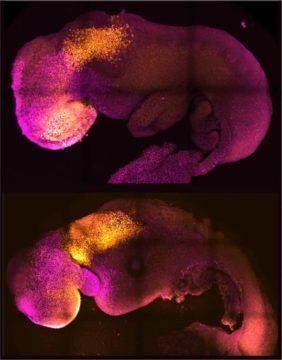Cassandra Willyard in Scientific American:
 The recipe for mammalian life is simple: take an egg, add sperm and wait. But two new papers demonstrate that there’s another way. Under the right conditions, stem cells can divide and self-organize into an embryo on their own. In studies published in Cell and Nature this month, two groups report that they have grown synthetic mouse embryos for longer than ever before. The embryos grew for 8.5 days, long enough for them to develop distinct organs — a beating heart, a gut tube and even neural folds.
The recipe for mammalian life is simple: take an egg, add sperm and wait. But two new papers demonstrate that there’s another way. Under the right conditions, stem cells can divide and self-organize into an embryo on their own. In studies published in Cell and Nature this month, two groups report that they have grown synthetic mouse embryos for longer than ever before. The embryos grew for 8.5 days, long enough for them to develop distinct organs — a beating heart, a gut tube and even neural folds.
The process is far from perfect. Just a tiny fraction of the cells develop these features and those that do don’t entirely mimic a natural embryo. But the work still represents a major advance that will help scientists to see organ development in unprecedented detail. “This is very, very exciting,” says Jianping Fu, a bioengineer at the University of Michigan in Ann Arbor. “The next milestone in this field very likely will be a synthetic stem-cell based human embryo,” he says.
